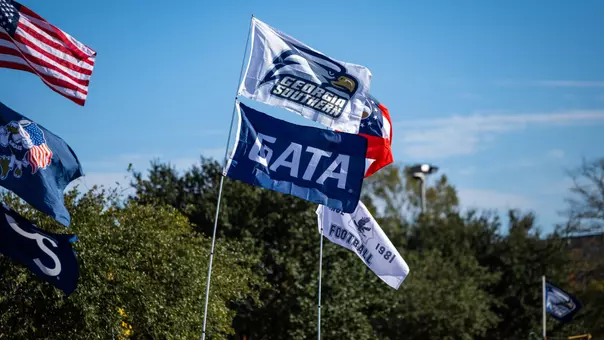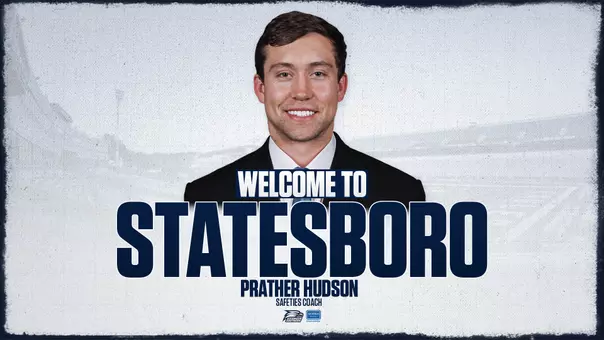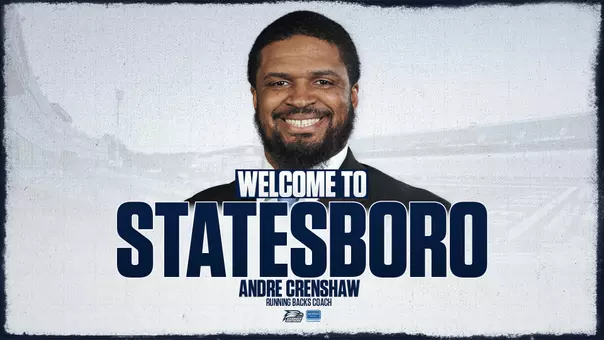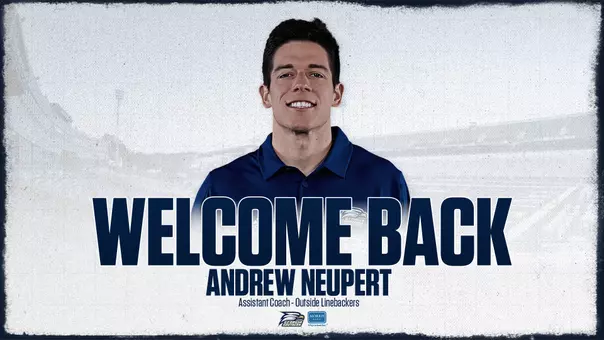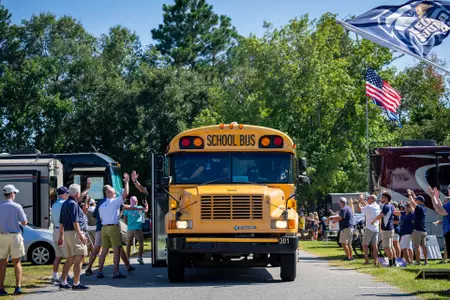
Southern Scribes: A Look at Georgia Southern Football Traditions
8/27/2024 11:30:00 AM | Football
STATESBORO - Every football team has traditions, and Georgia Southern Football is no different. The football program here at Southern is steeped in traditions that are the backbone of how this team got started and what it is now. The difference with Southern is that our traditions, while they may seem like they have been around forever, were started less than 50 years ago. In talking to current team members, coaches and staff and former team members, as well, we were able to get a picture of how these traditions developed and took shape over the course of Georgia Southern football's history.
1981-1986: The Beginning
Georgia Southern, at the time called First District A&M, sponsored its first football program from 1924 to 1941. In 1941, play was suspended due to the U.S.'s involvement in World War II, and after the conclusion of the war, football was shelved. Georgia Southern had other sports teams from 1945-1981, but it remained without a football program. In the late 1970s, University President Dale Lick decided that Georgia Southern needed to resurrect its football team. Although this is late compared to larger universities like UGA, which started its program in 1892, there are other programs across Georgia that have launched programs much later, such as Georgia State (2008) and Kennesaw State (2015).
Over the course of a few years, President Lick, alongside Director of Athletics Bucky Wagner, worked to get recruits, staff and a coach to start building what would become a six-time NCAA National Championship team at the Division I-AA level.
In the early days of Georgia Southern football's restart, they had to get used to making something out of nothing. When it started back up, there was very little funding for the program, but where they lacked in finances, they had a surplus of determination.
Roger Inman, the current Athletics Facilities Consultant, has been around since the beginning of GS Football and gave us some insight into what those early days were like—trying to find funding for equipment and transportation.
"In the early days, prior to starting football, my AD [Athletic Director] Bucky Wagner and I got in a van, and we left Statesboro," Roger told us. "Went from here to West Georgia, who had just started football. Went from West Georgia to Auburn, Auburn to Alabama, Alabama to Ole Miss, Ole Miss to Mississippi State, Mississippi State up to Vandy [Vanderbilt], Vandy over to UT [University of Tennessee], UT down to Georgia, and Georgia back down to Statesboro. We picked up every piece of equipment that each of those schools would give us to start football. Then, we made a separate trip down to Florida and Florida State. We started football with a bunch of makeshift equipment from the SEC and the ACC."
Although the team was resurrected in 1981, it didn't start fully competing at the I-AA level until 1984. Upon starting his position as the first head coach of Georgia Southern football in 40 years, Erk Russell quickly realized that a new team was a team without traditions. So, he began instilling tradition into Eagle Football.
When talking with the coaches, staff, and players, they focused on four main traditions. Three of these traditions, in addition to two of our most spirited sayings, originated with Erk Russell's guidance.
"One More Time" was a phrase that came from a 1986 Erk Russell quote. After the Eagles had won their second straight national championship, he said, "Hey ladies, hey fellas, hey gentlemen, One More Time for the greatest team in America." He continued using the phrase afterward as a motivator for the team in tough situations.
"G.A.T.A." is another Erk Russell phrase. He coined the phrase, "Get after their asses!" as a motivator and as a representation of the work-hard mentality of Georgia Southern football. The phrase was later shortened to GATA and remains a call to action across Georgia Southern Athletics today.
These two phrases are not the only legacy that Coach Russell left behind at Georgia Southern. He left a long-lasting legacy of blue-collar work ethic and a do-the-most-with-the-least attitude. He left behind a legacy of winning that has pushed the teams of today to maintain the values and traditions of the teams that came before them. He left a legacy of integrity - of doing the right thing no matter the circumstance.
Coach Russell also started many of the traditions associated with Beautiful Eagle Creek. The original football practice field was near the Eagle Creek Bridge, and with each practice, the team would have to start running as they got to the bridge. This tradition has since been updated with the transition of the football facilities, but Eagle Creek is still an important piece of history for the football team.
The final tradition that we want to touch on is the yellow school buses. This tradition was borne out of necessity. When the football program was first reinstated in 1981, it had very little money. Because of this, it struggled to find transportation for such a large team. After searching high and low, it came to the Bulloch County School District, which ultimately sold the program two old school buses for a dollar a piece. The team used these to get to and from the practice facilities.
Today, the school buses are used as part of the Eagle Walk. Each game day the team piles onto the school buses to ride through campus as they sing the Valley Song. The song was created by one generation of players and has gone through many iterations while still being an important part of creating brotherhood and team cohesion just before game time.
The Valley Song has become such an important part of gameday that it is a favorite across generations. From former players and now coaches BJ Johnson and Darius Safford to Eagle legend Adrian Peterson to current player David Dallas, the Valley Song prepares the team to march onto the field as one unit.
We talked to Tracy Ham, a Georgia Southern football great and our current Senior Associate AD over Administration, about what traditions meant to him and how the legacy of Georgia Southern football was created.
What do the traditions mean to you as a former player and current staff member?
"Well, I think when you talk about traditions, you are talking about the foundation of your program, what it sits on," he said. "The foundation of what your program really is about. I was a part of the first recruiting class in '82, so we didn't have any traditions. Our habits became our traditions. One of the things we always did was once you hit the bridge at Eagle Creek, you start jogging; that was just a tradition. And then once you start jogging, then you have to do your dips, and you hit the field running. When you got off the field, you had to do your dips, and then you came back and jogged to the bridge.
"Some of those things are non-existent because of where we practice now, but are things that were pillars for us as players. We wanted to make sure that we started things that would last and that would really be what the program is about. You know, the blue-collar, hard work, do more with less, if you have lemons, make lemonade. It really comes out of don't complain about what you have and don't have. What we tried to do was make sure that that turned into winning. If you're going to have traditions they need to help build a foundation to help win. So, those things at the time we were just doing them and didn't realize. We didn't have any meetings like, 'Yeah, we want to start this.' We didn't have those types of meetings; like I said, out of our habits, they just grew into traditions."
What do traditions do for a team, and why are they important?
"I think for me, when you look back at the teams that I was on, we felt like it was important so that the kids could know where the program came from and some of the struggles and trials and tribulations went through to get to where they are today," he explained. "We used to operate out of a trailer, the coaching staff, so our coaching staff should really appreciate being in this nice building. So, I think some of the traditions help the next generation appreciate where the program has come from and what it stands for."
What is your favorite Georgia Southern football tradition?
"I think you got to have the bus ride," he revealed. "So, the yellow bus ride, if you go back to how that came about, we were dressing in Hanner, our locker room was in Hanner. So, the yellow buses would originally take us to Statesboro High—that's where the program started. We were riding, and some guy started the Valley Song.
"One guy started singing that, and we just picked it up and so it just kind of gave us energy as we went to the stadium to get ready to play. Now, they've kept that tradition alive, even though they don't have to get on the bus, I think just getting on the yellow bus and doing the Eagle Walk, they've expanded the tradition. Coach Clay Helton says it best, 'We're gonna fight like hell to keep our traditions but continue to be innovative.' You've got to be innovative because you've got a new type of student-athlete, but they have to stand on something. We just felt like our traditions would help this generation stand on moving forward, and they would build some of their own traditions. Each team really builds their own traditions, just tweak them a little, like the Valley Song's been tweaked—a little modernization, it got a little more beat to it now. Traditions have a foundation, but we want kids to expand on them because it's their time, and really, those were things for our time. And the yellow school bus ride and the Valley Song have been one of the ones to stick, but we would think that just being blue-collar, hardworking, taking what you have, and doing something with it was the basis of who we were as Georgia Southern Eagles. We felt strongly about that in traditions because we felt we could go into any stadium and win. And we want traditions that develop into winning habits."
1987-2000: Building on the Legacy
Erk Russell may have led his team to success and started many of the traditions of Georgia Southern football that we hold dear today, but starting traditions is only half the battle. Traditions have to withstand the test of time to create a long-lasting legacy.
Some traditions were continued because the program had not really started to get settled yet. The team was still without a consistent flow of money, even as two-time national champions. This meant that the school buses were still a necessity. In addition to this, it was important to continue the things that had led the team to those two victories. This meant while the practice facilities remained across Eagle Creek, the team would start running as they reached the bridge every single time, they would sing the Valley Song and head to the field as one unit every single time, and they would push themselves to victory just one more time.
The Eagles experienced a few growing pains as they started to solidify as a team and build a consistent culture. After a few years of hard work, in his final year as head coach, Erk Russell led the team to its third National Championship in five years in 1989.
The Eagles continued to honor their proudest tradition after Russell's retirement by claiming the National Championship in 1990 before going through a period of transition. In the late '90s, under head coach Paul Johnson, the Eagles again solidified the tradition of winning by becoming national runners-up in 1998, followed by back-to-back championships in 1999 and 2000.
An important part of further affirming Georgia Southern's culture in the eyes of the public was the 1989 Hugo Bowl. Georgia Southern was scheduled to play Middle Tennessee State in what would be the first ever Thursday night home game at Paulson Stadium and just the second-ever Thursday night football broadcast on ESPN. Hurricane Hugo had other plans for the day.
Hugo, a category 4 hurricane, was headed toward Statesboro, and the predicted forecast of a torrential downpour and hurricane winds did not look good. Despite this, in true Eagle fashion, they decided to put their heads down and play anyway. Eagle fans, 16,449 of them, packed in for Paulson's first night game as they watched the Eagles, as much as they could see through the rain, on the way to a 26-0 win.
Terry Harvin, a former team punter, gave us a little insight into what it was like to play that game.
"And literally, the rain was sideways," he said. "The wind was blowing my football as I kicked it. And meteorologists all over the country were talking about, 'Here's this hurricane, the eye is going to land here, and just two hours south, they're playing a football game on ESPN.'"
Inman, the equipment manager at the time, brought a canoe to Paulson in preparation for the game. He thought the cheerleaders might like to use it as a prop, but by the end of the game, they probably could have used it to get home.
This game showed the toughness of Eagle football on live television. They put in the work, and they were going to play the game. This spread the blue-collar culture of the program deeper than just Statesboro and the culture of the Georgia Southern Eagles was set.
We talked to two former Eagle football players who experienced some of the team's early transitions.
Harvin is currently the General Manager of Georgia Southern Sports Properties and was a punter on the football squad from 1986-90.
What do the traditions mean to you as a former player and current staff member?
"Legacy. Legacy comes to mind when I think that what we did way back then is still going on," he explained. "And when I see the traditions, it brings back great memories of when I was here. And knowing that they're being held onto that people still value them. There are a lot of traditions that were created that we didn't have back then, like Freedom's Flight and the band playing "It is well with my soul." We didn't have that so you can see how they've elevated."
What do traditions do for a team, and why are they important?
"Again, I could go back to the word legacy," he said. "I think legacy is important. It helps with the culture of the program. It helps newer student-athletes connect better with those that got it started or older student-athletes. It kind of keeps the culture together for me. It lets you know that this is a special place—that's what traditions do. It connects the younger ones to the older ones and lets them know that what their job is is to leave it better than they found it."
What is your favorite Georgia Southern football tradition?
"Winning. Winning is the best one," Harvin told us. "Now, outside of that, I'd have to think about it a little bit. I like the old yellow school buses we would ride. We didn't have the Eagle Walk; it wasn't called the Eagle Walk. We rode the yellow school buses; they dropped us off, and we got off the bus. The bus and singing the Valley Song, that was special. But winning. That would have to be the one."
Adrian Peterson, perhaps the greatest player in Georgia Southern history, was a running back at Southern from 1997-2001 and, after a stint in the NFL, serves as the Director of Student-Athlete Development for the football program.
What do the traditions mean to you as a former player and current staff member?
"A lot, you know, I think our biggest tradition is winning," he stated. "When you walk into the FOC [Football Operations Center], all you see is winning. You know that's number one, and then the school buses. Just understanding how it came about. That was only transportation, and just being able to continue that is huge."
What do traditions do for a team, and why are they important?
"It's a bond," he explained. "Whether you are a student-athlete, a fan, or a guest, I think you see it and embrace it; it is something that can be passed down for generations. And generations just help traditions continue."
What is your favorite Georgia Southern football tradition?
"It's winning," he was quick to say. "It's winning. You know, a lot of individual records, but when all of us get together, it's great to have a debate on whose team was the best. Whether it was the early '80s, the mid-80s, you know, my era, or the guys now. So that's exciting. Not many schools have the opportunities to have those quote-unquote arguments, debates, and discussions. So, it's always fun."
2001-2020: Maintaining the Legacy
During the period after the six national championships and as the team began to transition along with the NCAA, it was important to ensure that the traditions of GS football did not die. As teams started to become three, four and five classes removed from the original group, it started to become imperative to remember where the team started.
The program started to really get its feet under it and garner more funding. As the program started to grow even more, leaders had to decide what to keep and what to move on from. The school buses were no longer a necessity, and the facilities were beginning to move across campus and away from Eagle Creek.
This meant the team and coaches had to be purposeful about what they wanted to maintain and turn into long-term traditions versus what they deemed unimportant to the former team's success. The school buses, Eagle Creek, and Coach Russell's sayings have stood the test of time.
The school buses remind future generations of players of how low this team started. Future generations of players should remember to appreciate what they have because it wasn't always that way. Eagle Creek serves as a reminder of the work ethic and toughness of the original Eagles, and the sayings remind the whole athletic department of Russell's legacy and the legacy of winning.
During this period, new traditions were also started. One of the most notable traditions that became a hallmark of Georgia Southern football is Freedom's Flight.
Freedom's Flight is a Georgia Southern football tradition that adds to the gameday experience for GS football fans. Before it became what we see today, Freedom's Flight went through a few different iterations.
The flight was originally planned for the graduation ceremony in the '90s. The university hired a bird that was used in sports events all over the country: Challenger. It was first proposed that the bird fly from the water tower near Paulson into the stadium, but they quickly found out that was not going to work. So, the flight became what we know it as today, flying from the top of the press box down to the field.
Georgia Southern has had several rescue bald eagles who have served as live mascots: Glory and Freedom are the most recent. Glory was a rescued eagle who was unable to fly due to an accident but still appeared at games as the live mascot beginning in 1998. Glory still resides at the Wildlife Center on Georgia Southern's campus, along with Freedom, our current live mascot.
Freedom, who recently celebrated his 20th birthday, made his debut flight from the top of Paulson Stadium in 2007 and remains the star of "The Most Exciting 30 Seconds in College Football."
Another gameday tradition that developed for the Georgia Southern Eagles, and a favorite of wide receiver Derwin Burgess Jr., is headbutting the Erk Russell bust on their way into the locker room. This might first seem like a silly tradition and one that is easily forgotten about, but it represents something bigger for GS football.
Erk Russell was the beginning of the Georgia Southern football program's revival. He came in and put the university on the map. Russell created many of the traditions that are still honored today, and this tradition was created to honor his legacy and remind the players of where the team began just before they took the field.
Current coaches Darius Safford and BJ Johnson are both former Eagle football players who were on this team during this maintenance period.
Darius Safford was a defensive back on the team in 2013, and he returned to Southern in January to join the defensive coaching staff.
What do the traditions mean to you as a former player and current staff member?
"I think the tradition really runs deep," he said. "I think, really, it shows up on Saturday, sometimes when your back is against the wall, you revert back to your training, revert back to those tough practices that we had at Eagle Creek. And again, just playing in the second round in Paulson Stadium and making this such a special place. Again, we talk about the traditions, going over to Eagle Creek and in that area riding those yellow buses over here, the meaning is tremendous. The fan support, too, once you get off those yellow buses, do the Eagle Walk, and having Paulson packed really serves its purpose of why this place is so special. And again, as I mentioned, when your back is against the wall and adversity hits, whenever you do that, or whenever that does happen, you revert back to your training. Again, all those early mornings, those tough practices, you know, all those long workout sessions with your brothers is again what makes you get over the top and makes you so special at this place."
What do traditions do for a team, and why are they important?
"I think tradition and culture kind of tie into one," Safford explained. "Because again, there's gonna be a lot of different people that come in and out of a place, in and out of a program, whether it's coaches or players now in the world that we live in as far as the transfer portal. And that's something that we can't get away from: the tradition of Georgia Southern football. Being the Brotherhood and wearing that blue and white should mean something, be something extremely special and prideful. So, when you look back at the rich history, the six national championships at the 1-AA level, multiple FBS wins, it all goes back to the blue-collar, roll up our sleeves and let's go to work. You know, grab the lunch pail, and regardless of if it's dang near 100 degrees out here, we're still gonna work against each other, and iron sharpens iron. So, when we do put on that blue and white here in Paulson and on the road and have the fan support. That's why it shows up as tradition being so special."
What is your favorite Georgia Southern football tradition?
"I love practicing at Eagle Creek," he started. "I think that's one that probably sticks out because of all the blood, sweat, and tears you put out there from the hot fall practices to the spring practices, you know, even during the winter workouts and everything like that. But my favorite, if I will have to say would probably have to be riding the yellow buses singing the Valley Song. It's something about that, again, there are no phones, not listening to your own music, it's about, you know, being in one accord, being on that yellow bus, everybody focused and locked in getting your mind right mentally for the game. So that has to be my favorite tradition."
BJ Johnson was one of the greatest wide receivers in GS football history and now serves as the wide receivers coach for the Eagles.
What do the traditions mean to you as a former player and current staff member?
"Traditions are everything for a place like this because it's not just something that we say, or it's not just for show," he explained. "The traditions that we have were here way before I got here in 2011. We were already going to Eagle Creek running across the bridge; we were already singing the Valley Song on the buses, we were already. So, all those traditions hold a lot of value just because it's been here since the early '90s all the way until 2024. So, to me, you know, and to the guys that take this field, to the guys that commit and sign with us, they know that we hold that at a very high value."
What do traditions do for a team, and why are they important?
"In my personal opinion, I think traditions let a team know how important what they're playing for is," he said. "Guys know when we sing the Valley Song, we are not only playing for the name on our back, or Georgia Southern, but we're playing for the guys that came before us that laid the foundation and started these traditions, and we're just gonna go out here and as I said, not only play for ourselves and the team but also play for those guys. I think tradition kind of brings a sense of awareness and heightening to 'Okay, let's go ahead and play for the guys that took the field before us.' "
What is your favorite Georgia Southern football tradition?
"The Valley Song," BJ revealed. "I think the Valley Song because you've got that eight-to-ten-minute window to where it's just you and your brothers on the bus, and you sing the song once you turn a certain corner of the street. Now I remember it like it was yesterday, we always sing once you turn left at the cafeteria. So, definitely the Valley Song because everybody is singing in one heartbeat, in one unison, the same way we take the field as one unit. The Valley Song kind of sets the tone, sets the tempo and then everybody's locked in, everybody's focused. I would definitely say, by far, the Valley Song."
2021-Current: The Clay Helton Era
"We will honor every tradition and fight like hell for innovation." - Clay Helton
Traditions pass on history. They create camaraderie. They support culture. They honor the past.
These are all things that current Georgia Southern football head coach Clay Helton understands fully and uses to motivate his team to get down and be tough no matter what. The current Eagle football squad has these traditions to build off of, so that they understand that Southern wasn't always what it is now. They should be grateful for what they have, but understand that what you have isn't what lets you win; it's what you do that makes the difference.
We talked to current players on the team to understand their perspective of what the Georgia Southern traditions mean and how they continue to honor the past.
David Dallas is a redshirt sophomore quarterback looking to make his first start after a long battle and recovery from a shoulder injury. For David, the Georgia Southern football traditions are about connection.
What do the traditions mean to you as a player?
"It means a lot. Honestly. Growing up in the state of Georgia I knew the great tradition of Georgia Southern: the great coaches, the great players, the toughness, the grit that Georgia Southern brings," David revealed. "That's why it's so cool. To play high school football in Georgia, and then I got to continue that in college and wear Georgia on my chest. It's been really cool to play here at Southern, and honestly, I had high expectations, but it's exceeded my expectations as far as just from sports staff, to what we have in the admin, to the coaches, to the players, it's just nothing short of incredible. Honestly win or loss, any game we walk off the field, we're always the tougher opponent. And that's what's been really cool. The tradition is sunk deep, deep, deep, and the roots are incredible. You can see it walking around through the facility. People that have stayed around like AP and Tracy ham and guys that just, it has meant so much to them, so they've come back and poured into the program. So, it's been really, really cool to even have the traditions of yellow school buses and the chants we do on the bus. Just the history of what it all means. It's incredible."
What do traditions do for a team, and why are they important?
"I think first and foremost, it allows everybody to relate," he explained. "People that have been in the school previous decades to now to recent alumni to coaches and players, everybody understands what it is to be a Georgia Southern Eagle and what it means to people that have been here and poured their sweat, their blood, and their tears out. It creates a special atmosphere when alumni feel comfortable coming back, and we can relate to them because they were in our shoes. And so, it's just really, really cool the connectedness and the unity amongst the alumni and the current student-athletes."
What is your favorite Georgia Southern football tradition?
"I'd say my favorite tradition we have is just the pregame riding around town in the yellow school buses," he stated. "Just thinking about all the previous players that have been in the exact same shoes, done the exact same thing, the same Eagle walk. The tradition of getting on the buses, going through, and doing our chants. There's nothing like that. If you ain't ready to play, I don't who you are because it fires you up, so really, really cool."
Derwin Burgess Jr., a senior wide receiver, stresses that these traditions are a non-negotiable part of gameday preparation.
What do the traditions mean to you as a player?
"The traditions we have, they really turn into game day rituals," Derwin stated. The things that we do have been here way before my time. It's ingrained in our heads that it's a ritual for our game. It's a mandatory ritual that we have to do, like headbutting Erk, singing the Valley Song and listening to the song in the locker room. These are mandatory things we have to do."
What do traditions do for a team, and why are they important?
"Having traditions does a lot for a team because not only does it go on for a long time, but it keeps the alumni true to what they did and gives them the respect that they deserve and earned," he explained. "It builds a legacy every day, each and every day."
What is your favorite Georgia Southern football tradition?
"My favorite Georgia Southern tradition is headbutting Erk," he was quick to tell us. I feel like it gives me power before the game, and it's just something that embodies me a lot."
The traditions of Georgia Southern football are important for more than just the team. They help to create the atmosphere and connection between the players, the fans, and the alumni. Traditions allow the current team to reach back and connect with the values that were instilled at the beginning of the program.
The traditions are important to the alumni, they are important to the coaches, they are important to the players, and they are important to the fans. And it is important for us, as we Hail Southern, G.A.T.A., and One More Time for the blue and white, to remember the people who started the program. The ones who gave equipment, who helped build the stadium, and who believed in Erk Russell to take the team to the top.
You can be a part of these traditions starting on Aug. 31 when the Eagles host Boise State at Allen E. Paulson Stadium. Tickets can be purchased at GSEagles.com/tickets.
